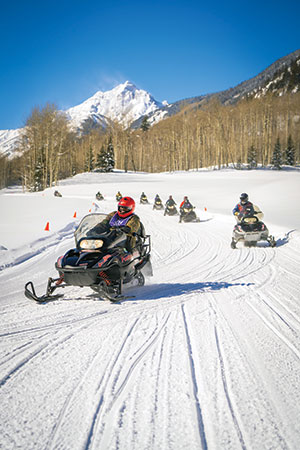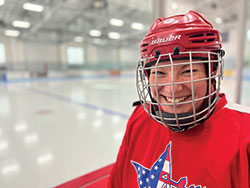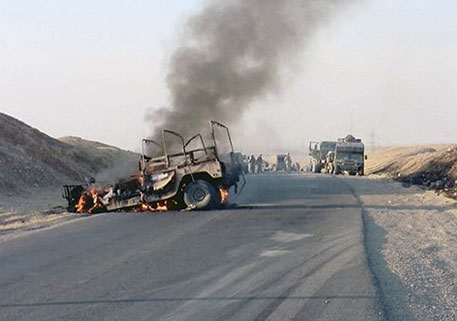
Talk to anyone who was there and they’ll tell you that the late-March skiing conditions in Snowmass, Colorado, were as good as they’ve ever been.
Heavy snowfall provided a deep base and the perfect backdrop for the more than 300 participants who came to take part in the 37th National Disabled Veterans Winter Sports Clinic, held March 26–31.
“It’s what I call ‘hero snow,’” said Paul Dowsett, a clinic volunteer ski instructor. “You absolutely cannot go wrong skiing and snowboarding on this.”
The “hero snow” came as the clinic—co-presented by DAV and the Department of Veterans Affairs—returned to full strength for the first time following the COVID-19 pandemic. The weeklong event featured adaptive sports, including skiing, sled hockey, fishing, curling, cycling and snowmobiling.
“Veterans tell us every year how life-changing and lifesaving adaptive sports have been for them,” said National Voluntary Services Director John Kleindienst. “So to expose hundreds of veterans to the winter sports clinic again is just a wonderful sight to see. It means we get to have an impact on more lives, and there’s no better feeling than that.”
“That impact from the clinic extends beyond sports,” said DAV National Commander Joe Parsetich.
“Adaptive sports like those you’ll experience are so much more than physical activity,” he told the participants during the clinic’s opening ceremony. “They’re a gateway to overcoming perceived obstacles and expanding what you believe is possible. I promise that whatever apprehension you may be feeling now will be replaced with elation after your first run down the mountain.”
That was the case for Army veteran Brenda Reed, who’s been to the clinic seven times. She felt vulnerable after her leg amputation, she said. Then she tried skiing.
“I love to get into that bi-ski and come flying down the mountain. It’s just the most exhilarating thing. [It’s] very freedom inspiring being an amputee and finally getting that speed back,” Reed, a 35-year DAV member and Department of Florida commander, said. “Being out here, I’m not vulnerable anymore.”
Dowsett has been coming to Snowmass for this event for nearly a decade. He said he loves seeing returning veterans come back psyched to participate and improve their skills, because they’ve found purpose in their lives.
“Because, yeah, it’s sports, but you realize that there are things that you can do and things that you should do that are just a little bit beyond your reach today, and then it gives you something that you can reach for tomorrow. And that’s applicable to so many things in life.”
Dowsett was one of more than 518 volunteers who spent the week serving as coaches, instructors and assistants for the participants. They also served meals, repaired equipment and transported veterans to the different activity sites.
This clinic was the first for volunteer Hiram Miller, a VA employee and disabled Army veteran. He spent the week as a boot loader, helping veterans in seated skis, called boots, get on the ski lifts. He said he loved seeing the participants’ faces as they ended their runs.
“Being here and having that experience has just been so good,” Miller said.
Army veteran Brad Howe has been a volunteer with adaptive sports since 2004. In the summer, he’s at the beach teaching adaptive surfing, but he’s a sled hockey instructor in the winter. On the rink at the Aspen Recreation Center, he helped fit participants with their sleds and coached them on the basics of moving around on the ice.
The payoff for him is witnessing veterans’ courage and transformation when they try sled hockey for the first time.
“I see someone that’s got fear in their eyes getting out on the ice, and by the end of the day, they’re laughing and crashing into each other and all that fear goes away,” Howe said.

One of the participants he coached was Minnesota Army National Guard veteran Sandi Braunstein. This was her second clinic, and like Reed, she’s an amputee.
Braunstein broke her leg in 2007 during a training exercise, but it never healed properly, even after undergoing multiple surgeries. After discussing options with her doctor and her daughters, she elected to remove her left leg below the knee in 2019.
“They wanted to see Mom on two legs, and I just wanted to be better,” said Braunstein.
Because of complications during the surgery, her planned two-week hospital stay turned into seven months. Then the COVID-19 pandemic made accessing her physical therapy and rehabilitation appointments more difficult. One of the first bright spots during that time was when her VA physical therapist recommended that Braunstein attend the 2022 clinic as part of her recovery process.
That’s where she learned about DAV and its role in co-presenting the event. The week affected her so much that she joined DAV Chapter 13 in Grand Rapids, Minnesota, when she got home.
“Even with some assembly required, I felt whole and I wanted more people to experience [the clinic], and I wanted to give that back,” said Braunstein.
Braunstein was named DAV’s Freedom Award recipient at this year’s clinic. The recognition is presented annually to the participant who best displays the courage, perseverance and determination the event represents. Despite the challenges she continues to face, she looks for ways to remain positive and joyful. She said she knows she, like everyone else, will have good days and bad days, but the camaraderie and connection she feels when she’s at the clinic extend to other areas of her life.
“Allow your burdens that you feel to become something beautiful, and this [clinic] does it for you,” she said. “And you’ll take that home, and it never leaves.”






